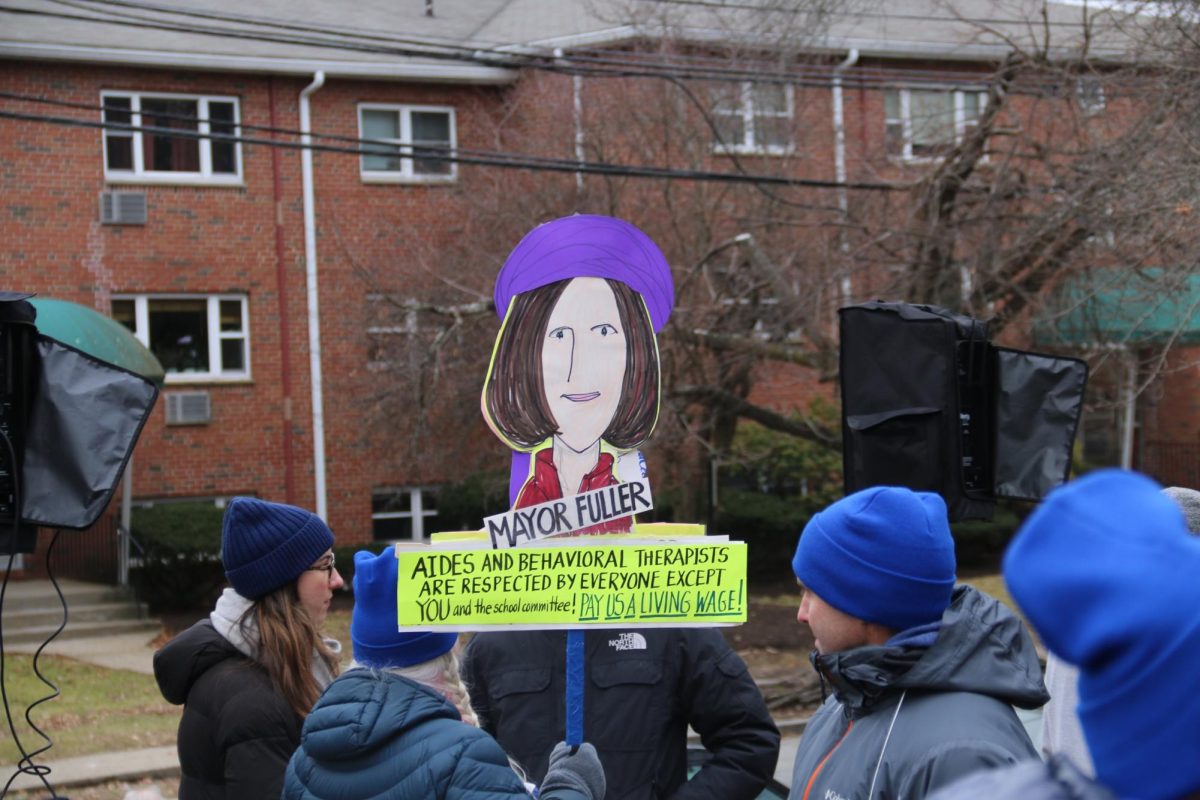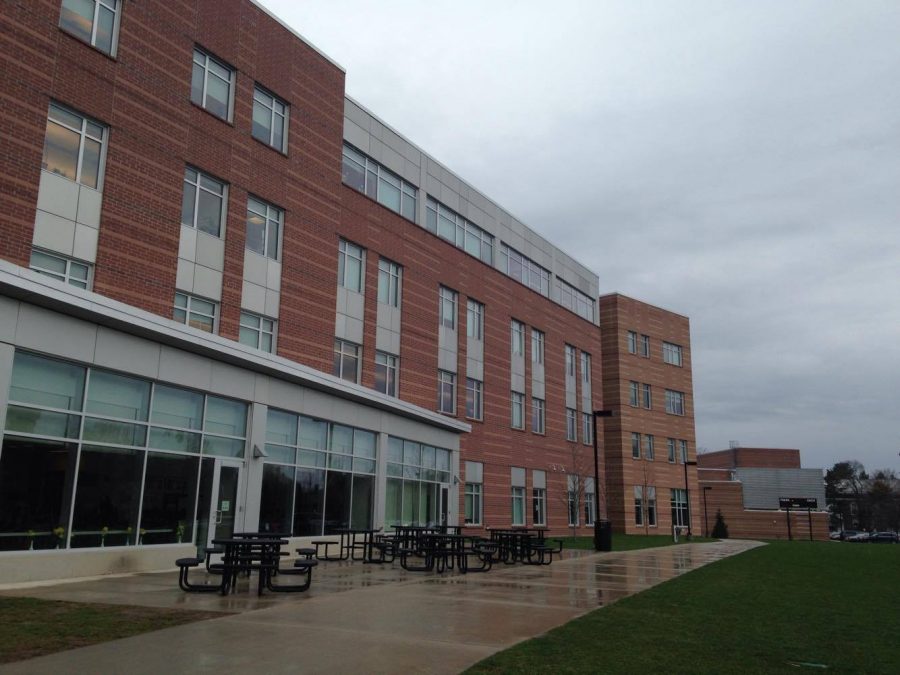See our article about the tentative contract agreement for more updated information.
by Emily Moss
Most students remember the yellow t-shirts that North teachers wore every Tuesday last spring with the words “competitive wages = excellent schools” printed on the back. Many have also seen blue yard signs on their neighbors’ lawns asking them to “support Newton educators.” Although school has been out over the summer, these images remind students that the teachers’ contract negotiations that began a year and a half ago are still underway.
Objectives
In broad terms, teachers across the district—represented by the Newton Teachers Association (NTA), an affiliate of the National Education Association—are looking to maintain competitive wages with teachers in nearby towns, including Brookline and Wellesley, among others, according to NTA president Michael Zilles.
In all of these towns, including Newton, teacher pay increases with years on the job. Teachers in Lexington and several other school districts, however, reach the top of their pay scales after only 12 years, while in Newton it takes 17 years to reach the top—a discrepancy that has left Newton teachers frustrated and discouraged.
Art teacher Eileen Gagarin noted, “When you know you’re doing the same job as someone 15 miles away, but you’re paid significantly less, you feel like you’re not as important.”
Similarly, English teacher Kate Shaughnessy said, “I think it’s been frustrating for teachers across Newton to feel that their hard work is not being valued.”
According to the Newton TAB, teachers with 12 years of experience in Newton would make $22,525 less than teachers with similar experience in Wayland and $15,070 less in Lexington.
“Realistically,” said Zilles, “teachers should earn more with more experience. But it doesn’t take 17 years to become a master teacher—it takes 10 or 12.”
The School Committee declined to comment until the union ratifies a contract.
Besides aiming to decrease the number of years required to reach the top of the pay scale, Zilles said teachers are seeking to increase their cost-of-living adjustments, which account for inflation from year to year.
Background
According to the Massachusetts Department of Education, which publishes the annual average teachers’ salaries in every Massachusetts district from the 1996-97 school year to the 2012-13 school year, teacher salaries in Newton have declined in relation to other Massachusetts school districts since the late 1990s.
Back in the 1996-97 school year, Newton had the 20th highest average teacher salary in the state, behind towns such as Weston, Concord, Lexington, and Belmont, and ahead of Wellesley, Brookline, and Needham. Newton nearly rose to the top during the early 2000s—ranking eighth in 2004-05 and fifth in 2005-06. More recently, however, Newton’s rank has declined, and in the 2012-13 school year, Newton came in 71st—behind all of the neighboring districts mentioned. That year, the average salary in Newton was $76,904, while the average salary for teachers in the highest-paying district in the state, Worcester, was $91,504, according to the Massachusetts Department of Education.
“We’ve just not kept pace,” said Zilles. “It used to be that when we negotiated, the city’s financial officer always argued that Newton was paying more than almost everyone else in the state. They could never make that argument now.”
Negotiation process
Zilles added that the teachers’ contract is renewed every three years, and that “salaries have been a real sticking point” for the past two or three rounds of negotiations.
Furthermore, Zilles said that each round of negotiations in Newton has taken much longer than in most other school districts. Teachers and School Committee members in Somerville, for example, were able to negotiate a contract after just seven meetings, according to Zilles.
Not long after the financial crisis of 2008, when the economy was still in a deep recession, Zilles said Newton teachers understood that it was necessary to make certain sacrifices. However, despite the fact that the economy has improved significantly since then, Zilles claims the School Committee has continued to resist reasonable increases in teacher pay.
As a result, Newton teachers have been working without a contract since the beginning of the last school year—a situation that Zilles said has been “dispiriting” for teachers.
Newton implications
Until a new contract is negotiated, teachers continue to work under the conditions of the previous contract.
At this point, the failure to agree on a new contract should have no effect on students, as teachers have continued to work as they did when they had a contract, including unpaid after-school commitments.
However, there are important rights that teachers lack in the absence of a new contract, according to Zilles. For example, if the district refuses to recognize a grievance put forward by teachers, Zilles said, the affected teachers are not legally permitted to seek a third party to mediate.
In addition, Zilles said he worries that the lower salaries in Newton might lead job applicants to turn down positions here and go elsewhere. Although he noted that no “systematic” trend of this sort has yet been documented, he has heard anecdotally that some applicants are showing a preference for other districts. In fact, according to Zilles, one Newton elementary school lost two finalists just this past year.
Gagarin expressed similar concerns about recruiting teachers, noting although she is very happy at North, were she now beginning her teaching career, she would have been very tempted to choose a job in Brookline over a job in Newton. She added that even some teachers who have been in Newton for a number of years are beginning to feel inclined to look at jobs in other districts.
Zilles wondered whether fewer applicants may be applying to teach in Newton in the first place, since it is now well known that salaries are higher elsewhere.
“My fear,” Zilles said, is that the School Committee will find out about the problem “when it’s too late to fix.”
Breaking News
- February 1Foreign exchange program departures set to proceed on schedule amid teacher strike
- February 1Teacher strike reaches two full weeks as contract negotiations continue to progress
- January 31Newton parent files lawsuit against NTA amid prolonged strike
- January 31Committee anticipates new union proposal on thirteenth day of strike
- January 30Rejected contract proposals prolong negotiations amid ongoing teacher strike
- January 28School days in jeopardy as contract negotiations continue, NTA compromise package awaits approval
- January 25Teachers strike marks seventh day with progress in ongoing negotiations
- January 25Controversy surrounds NPS instagram posts criticizing teachers’ strike
- January 25Congresswoman Ayanna Pressley supports Newton Teachers Association in urgent call for education funding
- January 23Teachers continue strike amid fines and ongoing negotiations
TOP POSTS
- Wrestling Head coach John Staulo honored with induction into New England Hall of Fame after 27 years of coaching at North
- North's jazz ensemble strikes gold at MAJE regional festival
- Art Major IV students paint new generation of murals
- Winter varsity dance team shines at UDA nationals despite budget cuts
- New cafeteria lunch containers help make North more sustainable
- Boys hockey falls to Weymouth at annual senior night
- Chicago brings the roaring 20s to Lasker Auditorium
- Improv Jam provides the audience with a top-tier experience interacting with the show
- Sophomore speeches showcase variety of underrepresented topics
- Mean Girls Adaptation Lacks Spark of Original Movie
























































